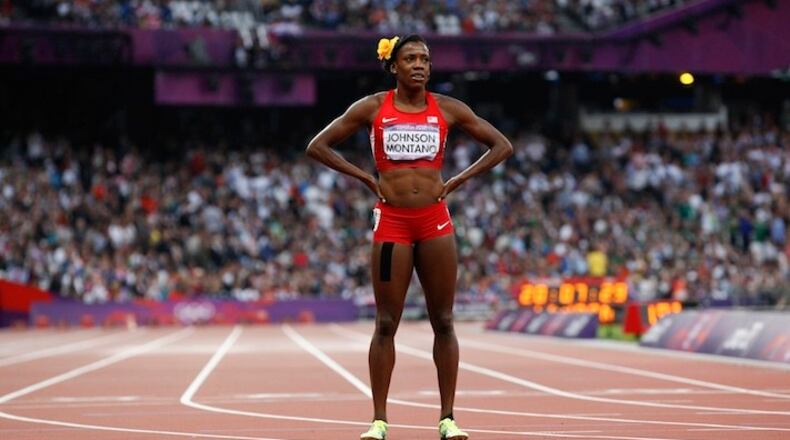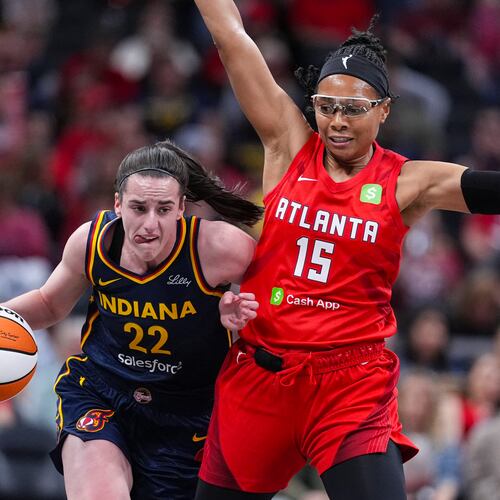There have been many doping scandals, too many, but if allegations about the demanding and extorting of bribes to cover up test results are true, track and field’s former leader Lamine Diack and his minions and relations took the category to a new level of low by corrupting from the top.
It is a big, particularly rank can of worms, and the Diack damage, along with the Russian federation’s suspension from the sport, raises the question of what might be done for athletes who have missed out on their rightful rewards.
Reallocating medals has become standard practice — depressing testimony to how often that sports event you just watched turns out to be a sham.
But what about a more radical approach: paying reparations to those who were cheated?
“I think that’s quite tricky legally, but look, I’m not ruling anything in, and I’m not ruling anything out at the moment,” Sebastian Coe, Diack’s successor as president of the International Association of Athletics Federations, said in a recent interview.
The idea is certainly worth a long look, and there is the possibility that legal action could make it even more pressing business. Doping is fraud, and so is covering up doping when it allows for competition by athletes who should have been excluded.
“There’s so much stuff you can’t get back; it’s like a class-action lawsuit that we’re looking at,” said Alysia Montano, the American 800-meter runner who finished fifth at the 2012 Olympics behind two Russians accused of cheating and fourth at two world championships behind one of them.
The Canadian racewalker Evan Dunfee, who is particularly outspoken on doping issues, declared last week that since 2005, Russian racewalkers had effectively “stolen” $1.7 million in prize money from clean athletes with their performances in world championships and the World Walking Cup.
But prize money and sponsor bonuses are only part of the loss. Even more difficult to recover are the value of would-be endorsements, appearance fees and contracts.
“It’s just so much domino effect,” Montano said.
There is also the mental anguish of defeat, more destructive when an athlete suspects being cheated.
“I’ve seen a number of athletes who were so concerned and angry about what everybody else was doing or may have been doing that it literally ruined their careers and their lives,” said Adam Nelson, a former shot putter from the United States.
Nelson is particularly well placed to speak to this issue. He was awarded the gold medal in the shot put nearly nine years after the 2004 Olympics when retesting resulted in the Ukrainian Yuriy Bilonog’s being stripped of his gold.
“I jokingly refer to the fact that I am actually the most recent gold medalist and kind of, sort of the defending champion because I received my medal in 2013 at the food court in the Atlanta airport,” Nelson said.
But the material effect of his winning in 2013 instead of 2004 is no joke.
“Losing out on the gold medal in 2004, that cost me over $2 million in future earnings,” Nelson said.
Montano estimated her lost bronze medals had cost her $500,000.
“It’s going to be really interesting to see if any athletes bring any claims,” said Sean Cottrell, the founder and chief executive of the British website LawInSport.
The question is whom to target: the IAAF, the Russian federation or the penalized athletes themselves.
“It will be very expensive to go after the athletes, and I’m not sure how much money Russian athletes have at this stage,” Cottrell said.
Last year, the Track and Field Athletes Association, a still-fledgling group led by Nelson, called on the IAAF, the World Anti-Doping Agency and the Russian federation to pay reparations to athletes “denied their rightful competition placements.”
“It would be a huge symbol, a huge gesture from the IAAF to recognize and take ownership of the fact that they really did mess up, and it’s not just the IAAF,” Nelson said.
It would indeed be a symbolic gesture, as would be a revote for the site of the 2021 world championships. The IAAF Council last year awarded the event to Eugene, Oregon, without a bidding process and with Diack pushing hard behind the scenes.
Coe said the IAAF would examine the possibility of fining athletes who broke doping rules but said allocating money from those fines to the wronged could prove legally complicated. It could also prove premature: How to have confidence at this dire stage that the beneficiaries would be truly clean, either?
Still, Nelson believes the time has come for athletes to be rewarded financially for following the rules.
With the statute of limitations on retesting doping samples now at 10 years after the initial test, Nelson proposes deferring compensation for athletes into a “fair play” fund, which could be bankrolled by the IAAF, meet directors or sponsors.
The idea? Keep a clean record for those 10 years, and collect a bonus.
“There’s a need to actually start to align your overall values with the compensation model,” Nelson said. “That’s usually what it takes to change a culture, unfortunately.”
While the opprobrium has been rightly directed at the sport’s administrators of late, reform is not all about the now-chastened Coe. There is also the issue of what the athletes themselves should do differently.
Not dope, you might answer (or perhaps shout, at this stage).
But Nelson and others also believe it is time for athletes to play a much more proactive and collective role, policing themselves and changing the culture from the ground up instead of relying on the top-down model that has failed miserably. That clearly means much more of a neighborhood watch approach.
The IAAF already has an athletes’ commission, whose members — a mix of former and current athletes — include the American decathlete Ashton Eaton, one of the sport’s biggest stars. But Nelson and Dunfee, the racewalker, believe the commission is too much under the IAAF umbrella and too constrained.
The Track and Field Athletes Association or another organization like it could be the equivalent of an independent players’ union.
“You can’t change a culture just by making new policies,” Nelson said. “We athletes need to start talking much more openly.
“Depending on what estimates you use, 75 to 85 percent of all athletes are doing the sport the right way. And it’s incumbent upon that significant majority doing it the right way to start taking ownership of this and say, ‘We’re not going to tolerate the 15 to 25 percent of you who are not doing it the right way, and furthermore, we are not going to allow the coaches who perpetuate the myth that there is only way to win to come into our culture and mislead another group of athletes.’ That can’t happen just from the top down.”
Coe is now adamant that he wants “more whistle-blowers.” Nelson resists the use of that term, but this is semantics. He knows that the flow of information behind the scenes — fueled by well-grounded suspicions — has to increase soon and significantly.
“It looks poor if we cast doubt on someone’s results,” he said. “But we know the difference between poor sportsmanship and jealousy and when something just doesn’t smell right. Athletes know that better than you do. We truly do, so now we have to find a way to address that.”
About the Author
Keep Reading
The Latest
Featured


